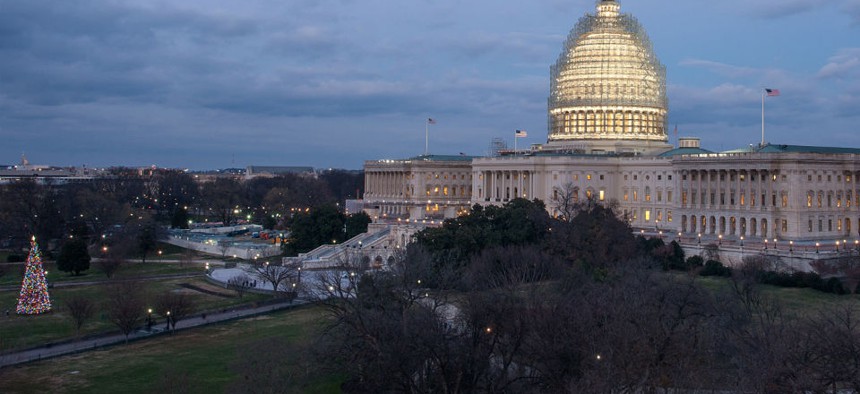
Architect of the Capitol file photo
Despite Senate’s Confirmation Spree, Many Agencies Maintain Key Leadership Vacancies
The White House is reviewing which appointees to re-nominate for the 114th Congress’ approval.
The Senate closed out a historically gridlocked 113th Congress with a rare display of productivity: the upper chamber confirmed dozens of President Obama’s appointees in the final weeks of the legislative session.
The confirm-a-thon filled the ranks of mid-to-high-level positions at agencies across government. The confirmations provided certainty to agencies and nominees alike, some of whom had been languishing for months or even years, and faced dimmer prospects in next year’s Republican-controlled Senate.
But key leadership roles remain unfilled and many nominees will now have to decide if they once again want to grind through the legislative gears of the confirmation process.
The Energy Department received a mixed bag from the Senate. Four of its outstanding nominees were confirmed in the closing days of the 114th Congress, but three did not receive a vote. Brad Crowell, Energy’s assistant secretary for congressional and intergovernmental affairs, told Government Executive he was both happy -- as the newly confirmed appointees are “huge assets” for the agency -- and disappointed -- as several “mission-critical positions” are still unfilled.
“While it is unfortunate that the Senate was unable to confirm all of the department’s outstanding nominees, we are optimistic that that they will be confirmed as soon as possible in the next Congress,” Crowell said. “Secretary [Ernest] Moniz has great bipartisan relationships with members in both chambers of Congress, including Sen. Murkowski, [R-Alaska,] the incoming chair of the Senate Energy Committee, and we will continue to work to ensure these well qualified nominees get confirmed.”
The Environmental Protection Agency perhaps made out the worst of any agency, with the Senate declining to take up any of EPA’s pending nominees in the final weeks of Democratic control. After enduring yet another year with a reduced budget, six EPA nominees went unconfirmed. With a new Republican majority bent on diminishing EPA’s power, the nominees’ chance of receiving Senate approval moving forward appears, at best, at risk.
Luke Bolar, a spokesman for the Senate Environment and Public Works Committee, which is tasked with preliminary vetting of EPA nominees, said of the appointees that “Senate Republicans had concerns over the EPA’s overreaching regulatory agenda.”
Its nominees -- who hold “qualifications for the job [that] are not in dispute,” according to an EPA spokeswoman -- along with the unconfirmed nominees at all agencies, must agree to be re-nominated if they are again tapped by the White House. The waiting game has professional consequences for some; EPA nominee Tom Burke, for example, was forced to relinquish his deanship at Johns Hopkins University. Most nominees have already gone through congressional hearings and been voted out of committee, and they will now have to decide if they want to go through that process again.
An Obama administration official said the White House is currently sorting out the logistics of re-nominating unconfirmed appointees.
“We are working through the holidays reviewing paperwork and making decisions about how and when we’ll re-nominate people who were not confirmed in the last Congress,” the official said. More information will be available when lawmakers convene in January, he added.
The Education Department was another victim of Senate inaction. Four of the agency’s five vacancies went unfilled. Education Secretary Arne Duncan said he was “thrilled” with the one confirmation the agency received, and said he looks forward to working with the Senate next year to gain confirmation of the department’s remaining nominees.
On the opposite side of the spectrum, the Homeland Security Department saw its nominees overwhelmingly approved by the 113th Congress, with just one nominee unconfirmed. DHS Secretary Jeh Johnson has called filling the vacancies a key priority, saying “good leadership begins with adding other good leaders to our team.” Of course, while the agency holds just one outstanding nominee -- who Johnson urged the Senate to confirm -- it will face different operational restrictions brought on by its short-term funding.
The Postal Service perhaps suffered the biggest immediate blow from the Senate’s failure to confirm its nominees. USPS’ governing board lost its quorum to make any decisions, and while it appears to have found a workaround, lawmakers have said inaction has left the agency “twisting in the wind.”
The Social Security Administration faces the highest-level vacancies of any agency, without a confirmed commissioner or a new deputy commissioner. Acting Commissioner Carolyn Colvin appeared poised for confirmation after sailing through the Senate Finance Committee, but her approval was ultimately blocked by Republicans upset over a failed $300 million computer system overhaul at the agency. Senate Democrats were forced to scrap a vote on her nomination in the 11th hour.
Still, Colvin will soldier on as deputy and acting commissioner.
“She looks forward to working with the new Congress, and with the dedicated and professional employees” that make SSA a top-ranked place to work, said LaVenia LaVelle, an SSA spokeswoman.
While the Senate confirmed 14 ambassadors in December, a dozen diplomats and several State Department officials were not confirmed.
In the coming weeks, the White House will decide who deserves re-appointment; the nominees themselves will decide if they want to once again put themselves at the mercy of “the world’s greatest deliberative body.”
NEXT STORY: A Federal Holiday Poem







